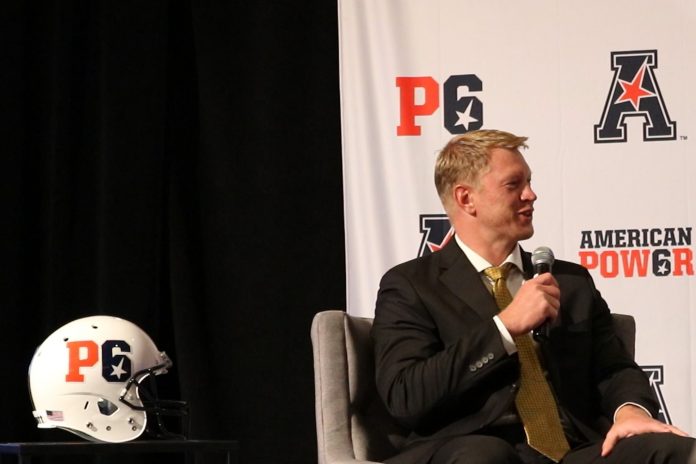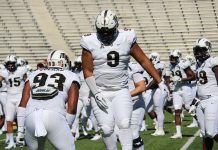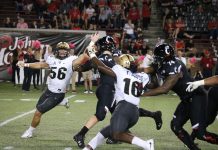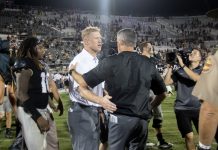NEWPORT, R.I. – A year at the helm of a recovering football program can change people, alter perceptions and tolerances. It can take years off your life – it can shake your faith in everything you know.
For Scott Frost, a full season and concurrent off-season have calmed the storm of uncertainty, bringing with it a certain calm before the Second Frost in Orlando. The former Nebraska gunslinger could be seen with a genuine smile on his face all over the AAC Football Media Days in Rhode Island, just twelve months removed from his first visit as a Knight.
“I actually went for a run this year, I got to see Newport a little bit,” Frost said. “I watched an inning of the Newport Bulls minor league baseball game, so I’ve enjoyed it a little bit more this year.”
It is a stark contrast from the bottled-up newcomer who learned to answer questions with the calculated repetitiveness of a man holding his cards close to his chest, who wouldn’t give anyone a glimpse behind the curtain.
A legendary list of influences trails behind Frost, going a long way towards explaining the cool, collected manner of UCF’s top man. He can point to a collegiate career that began at Stanford under Bill Walsh, recall the lessons learned from Nebraska icon Tom Osborne, and rub elbows with current coaches around the upper echelon of both collegiate and NFL head coaching circles.
To this day he credits Pittsburgh Head Coach Mike Tomlin and Atlanta Wide Receivers Coach Raheem Morris as the two men who played the biggest role in pushing him towards coaching him after a journeyman season in Tampa Bay. Both men worked with Frost every day as defensive assistants, both men saw the hunger in his eyes and have publicly praised passion for precise execution.
Speaking to USA Today after landing the UCF gig, Frost mentioned that Tomlin had called him seven or eight times about what it meant to be a first-time head coach. For some perspective, Tomlin was deep into a playoff run and still found the time to reach out to a former player.
“You know, coaching is a fraternity like anything else. There’s people that you’re close to,” he offered. “There’s coaches that you become close with and develop relationships with and certainly a lot of the Oregon guys, several guys in the Pac-12, some guys in the NFL. So guys that I’ve been around and am friends with, whenever I need something they’re always there.”
These relationships are far beyond professional respect and courtesy. The comradery built between the chosen few men in this country that can captain a roster of testosterone-frothing athletes who love to smash into each other with the intent of a ballistic missile is a bond that runs deep below the surface; it can creep into any aspect of the day-to-day.
“Sometimes it’s football, sometimes it’s off the field things, sometimes its organizing our program, sometimes you just call to say hello,” he said of the connections he maintains today.
If you can take a look back to his formative years, it is clear where much of his even-keeled demeanor and quiet trust in the benefits of steady, continuous improvement every day originate.
“Tom Osborne is probably the biggest mentor I’ve had as a player. Unbelievable human and a man of such high character that he sets a great example [for any player],” conceded Frost.
Leaving a spot on the Stanford roster under the iconic Bill Walsh would have seemed blasphemous to most anyone at the time – let alone as a gifted young quarterback. Osborne attracted Frost back to Nebraska, the stomping grounds of his parents, and together the two made deep runs into contested title territory in both 1996 and 1997.
Consider the magnitude what that means for coaching styles. Transferring meant sitting out an entire season, meant cutting loose the progress made from an entire year in a different system. It meant that there had better be trust in the process, that Osborne was selling a product his guys could believe in – evidenced by his success in national recruiting as well.
If you look closely enough, the “player’s coach” mentality boldly outlines the redirection of UCF football. Consider that of the players who were grandfathered in from the previous regime constantly talk about how much more they enjoy playing in this system, how free they are to individually express themselves.
“He came in and he just changed our lifestyle,” explained Nose Guard Jamiyus Pittman. “He changed the way we think, the way we think about football. It’s mental for Coach Frost. We’re going to beat you every play. If a team is not disciplined, they won’t last against us.”
“It’s a blessing that coach Frost came here. I’m just grateful that the AD [Danny White] asked a couple of players what would we want in a coach, and that’s exactly what we got. We got what we asked for.”
In year one Frost got what he asked for from his players – belief and the will to win. The UCFoundation has now been set, the standard of excellence has been raised, and year two beckons eagerly.







